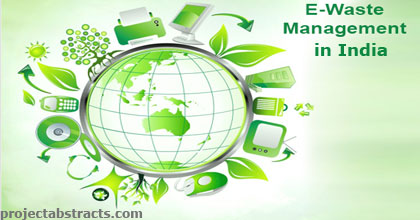The electronic industry is the world’s largest and fastest growing manufacturing industry in the world. The increasing “market penetration” in developing countries, “replacement market” in developed countries and “high obsolescence rate” of electrical and electronic goods make electrical and electronic waste (e-waste) one of the fastest growing waste streams.
E-waste is valuable source for secondary raw material but harmful if treated and discarded improperly as it contains many toxic components such as lead, cadmium, mercury, polychlorinated biphenlys etc. (Bandyopadhyay, 2010).
The quantity of e-waste generated in developed countries equals 1% of total solid waste on an average and is expected to grow to 2% by 2010 (UNEP Manual, 2007).In United States alone, 1,30,000 computers and 3,00,000 cell phones are trashed each day (Anderson, 2010).
The developed countries use most of the world’s electronic products and generate most of the E-waste (Basel Action Network, 2002). Rather than treat e-waste in an environmentally friendly manner, the developed countries are finding an easy way out of the problem by exporting these wastes to developing economies especially, South Asian countries (Basel Action Network, 2002).

E-Waste Management in India
The import of e-waste to the developing countries is in violation of the ban imposed by Basel Convention on the Control of Transboundary Movements of Hazardous Wastes and their Disposal, as e-waste come under the definition of hazardous waste (Basel Convention, 1992).Following this, our country, a party to the convention, banned the import of hazardous waste including e-waste into the country. But a major source of e-waste in India is illegal imports (Sathish, 2006).
The major portion of the e-waste generated domestically as well as illegally imported are recycled in crude manner leading to pollution of the environment. Lack of legislation in our country at present is aiding this hazardous form of recycling. Therefore there is urgent need to frame and implement rules for regulating this waste and to find environmentally sound, economically viable methods for recycling and disposing of this necessary evil. The necessity of environmentally sound management of e-waste is brought out with the help of a case study of uncontrolled dumping of e-waste.
Download Project – E-Waste Management in India
>> Best Final Year Project for Civil Students in Environmental Engineering